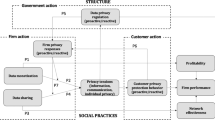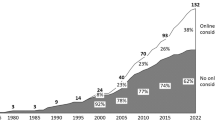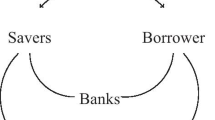Abstract
Information markets are inefficient. Information products have large upfront development costs, yet their duplication costs are negligibly small; and they are experience goods with high costs of marketing and promotion. As a result, either winner-take-all markets are created through large and expensive promotional campaigns, or artificial monopoly power is conferred by the government through copyright protection, or both, to prevent the collapse of these markets from intense price competition and piracy. Such inefficiency creates opportunities to design more efficient markets by utilizing new technologies. Trust networks provide such an opportunity where the network infrastructure acts not only as a distribution system for information products, but also as an advertising and promotion medium, a payment and pricing mechanism, a guarantee and insurance service, and a copyright enforcement and dispute resolution tool. Such a network-centric market place is proposed to remedy many of the shortcomings of mass markets by relying on peer-to-peer distribution, peer-to-peer payments, and peer-to-peer enforcement of trust and integrity. Analytical models are presented to show that such a market place for information goods can scale up to satisfy large markets without expensive promotions and advertising campaigns, create customized products with dynamic pricing, reduce entry costs by eliminating the distinction between buyers and sellers, and eliminate the need for copyright protection.




Similar content being viewed by others
References
Andersen, R. et al. (2008). Trust-based recommendation systems: An axiomatic approach. Proceedings of WWW conference. pp. 199–208.
Adomavicius, G., Tuzhilin, A., & Zheng, R. (2011). REQUEST: A query language for customizing recommendations. Information Systems Research, 22, 1.
Arora, G., Hanneghan, M., & Merabti, M. (2005). P2P commercial digital content exchange. Electronic Commerce Research and Applications, 4(3), 250–263.
Asvanund, A., et al. (2004). An empirical analysis of network effects in peer-to-peer music sharing networks. Information Systems Research, 15(2), 155–174.
Bakos, Y., Brynjolfsson, E., & Lichtman, D. (1999). Shared information goods. Journal of Law and Economics, 42(1), 117–156.
Chesbrough, H., & Spohrer, J. (2006). A research manifesto for services science. Communications of the ACM, 49(7), 35–40.
Conley, J. P., & Yoo, C. S. (2009). Nonrivalry and price discrimination in copyright economics. University of Pennsylvania Law Review.
Dellarocas, C. (2003). The digitization of word of mouth: Promise and challenges of online feedback mechanisms. Management Science, 49(10), 1407–1424.
Dockner, E. J., & Frucghter, G. E. (2004). Dynamic strategic pricing and the speed of diffusion. Journal of Optimization Theory and Applications, 13(2), 331–348.
Easley, D., & Kleinberg, J. (2010). Networks, crowds, and markets. Cambridge: Cambridge Press.
Frank, R. (1996). Winner take all society. New York: Penguin Books.
Feng, Y., Guo, Z., & Chiang, W. K. (2009). Optimal digital content distribution in the presence of consumer-to-consumer channel. Journal of Management Information Systems, 25(4), 241–270.
Galbreth, M. R., Ghosh, B., & Shor, M. (2012). Social sharing of information goods: Implications for pricing and profits. Marketing Science, 31(4), 603–620.
Goetsch, K. (2014). Ecommerce in the cloud. New York: O’Reilly.
Guha, R., Kumar, R., Raghaven, P., & Tomkins, A. (2004). Propagation of trust and distrust. Proceedings of conference on WWW. pp. 403–412.
Handy, C. (1995). Trust and the virtual organization. Harvard Business Review, 73(3), 40–50.
Hosanagar, K., Han, P., & Tan, Y. (2010). Diffusion models for peer-to-peer (P2P) media distribution: On the impact of decentralized. Constrained Supply. Information Systems Research, 21(2), 271–287.
Josang, A., Ismail, R., & Boyd, C. (2007). A survey of trust and reputation systems for online service provision. Decision Support Systems, 43(2), 618–644.
Khouja, M., et al. (2008). Application of complex adaptive systems to pricing of reproducible information goods. Decision Support Systems, 44, 725–739.
Kim, Y. A. (2015). An enhanced trust propagation approach with expertise and homophily-based trust networks. Knowledge Based Systems, 82, 20–28.
Krishnan, T. V., Bass, F., & Jain, D. C. (1999). Optimal pricing strategy for new products. Management Science, 45(12), 1650–1663.
Lang, K., & Vragov, R. (2005). A pricing mechanism for digital content distribution over peer-to-peer networks. Journal of Management Information Systems, 22(2), 121–139.
Lessig, L. (2008). Remix: making art and commerce thrive in a hybrid economy. New York: Penguin Press.
Li, Y. M., Lin, C. H., & Lai, C. Y. (2010). Identifying influential reviewers for word-of-mouth marketing. Electronic Commerce Research Applications, 9, 294–304.
Liu, S., et al. (2015). Identifying effective influencers on trust for electronic word of mouth marketing: A domain aware approach. Information Sciences, 306, 34–52.
Lopez-Pintado, D. (2008). Diffusion in complex social networks. Games and Economic Behavior, 62(2), 573–590.
McKnight, D. H., Choudhury, V., & Kacmar, C. (2002). Developing and validating trust measures for e-commerce: An integrative typology. Information Systems Research, 13(3), 334–359.
Orman, L. (2013). Bayesian inference in trust networks. ACM Transactions on MIS, 4(2), 1–26.
Orman, L. (2011). The potential of virtual institutions. IEEE Technology and Society, 30(1), 56–64.
Postmes, T., & Branscombe, N. (2010). Rediscovering social identity. New York: Psychology Press.
Sundarajan, A. (2004). Managing Digital Piracy: pricing and protection. Information Systems Research, 15(3), 287–308.
Swaminathan, A., et al. (2010). Relating reputation and money in online markets. ACM Transactions on the Web, 4(4), 17.
Tunca, T., & Wu, Q. (2013). Fighting fire with fire: Commercial piracy and the role file sharing on copyright protection policy for digital goods. Information Systems Research, 24(2), 436–453.
Vega-Redondo, F. (2007). Complex social networks. Cambridge: Cambridge University Press.
Wei, W., & Ram, S. (2012). Using a network analysis approach for organizing social bookmarking tags and enabling web content discovery. ACM Transactions on MIS, 3(3), 15.
Wei, X., & Nault, B. R. (2013). Experience information goods: Version to upgrade. Decision Support Systems, 56(12), 494–501.
Xiong, L., & Liu, L. (2004). Peertrust: Supporting reputation-based trust for peer to peer electronic communities. IEEE Transactions on Knowledge and Data Engineering, 16(7), 843–857.
Ziegler, C. (2009). On propagating interpersonal trust in social networks. In Computing with Social Trust (pp.133–168). New York: Springer.
Author information
Authors and Affiliations
Corresponding author
Rights and permissions
About this article
Cite this article
Orman, L.V. Information markets over trust networks. Electron Commer Res 16, 529–551 (2016). https://doi.org/10.1007/s10660-016-9219-6
Published:
Issue Date:
DOI: https://doi.org/10.1007/s10660-016-9219-6




